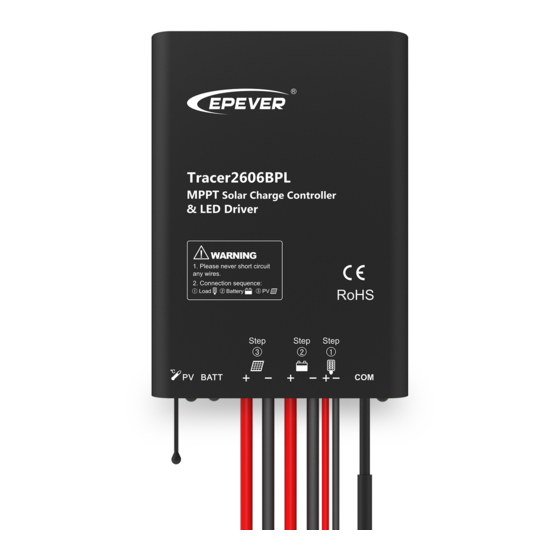コントローラー Epever Tracer5206BPLのPDF クイック・スタート・マニュアルをオンラインで閲覧またはダウンロードできます。Epever Tracer5206BPL 2 ページ。 Mppt solar charge controller
Epever Tracer5206BPL にも: クイック・スタート・マニュアル (3 ページ), クイックマニュアル (2 ページ), クイック・スタート・マニュアル (2 ページ)

※Thank you for selecting the Tracer BPL series lithium battery
MPPT solar charge controller with built-in LED driver. Please read
this manual carefully before using the product and pay attention to
the safety information.
Tracer-BPL Lithium Battery Solar Charge Controller
1. Safety Information
Read all of the instructions in the manual before installation.
DO NOT disassemble or attempt to repair the controller.
Install external fuse or breaker as required.
Do disconnect the solar module and fuse/ breakers near to battery before installing
or moving the controller.
Power connections must remain tight to avoid excessive heating from a loose
connection.
Only charge batteries that comply with the parameters of controller.
Battery connection may be wired to one battery or a bank of batteries.
Risk of electric shock, the PV and load can produce high voltages when the
controller is working.
2. Overview
The Tracer BPL series lithium battery MPPT solar charge controller combines solar
charge controller and LED constant current driver into one unit which is ideal for solar
LED Lighting, especially when dimmer function is needed. The advanced Maximum
Power Point Tracking charging methods enables the system charging and discharging
management to obtain the most radical optimization. Increase the system flexibility, yet
lower down the system cost. The features are listed below:
Adopt high quality components of ST,IR and Infineon, make sure product using
lifespan
Wide working environment temperature(-40℃~60℃)
Apply to lithium battery(LiFePO4/Li-NiCoMn)and battery(Sealed/Gel/Flooded)
Lithium battery self-activating and low temperature protection function
Maximum conversion efficiency of 98%
Advanced Maximum Power Point Tracking (MPPT) technology, with tracking
efficiency no less than 99.5%
Ultra-fast tracking speed and guaranteed tracking efficiency
Accurately recognizing and tracking of multiple power points
Digital precision constant current control and the control accuracy are less than ±2%
Load reduce power automatically
Maximum output efficiency of 96%
PV and Load power limitation function
The output current can be adjusted among the rated power and current range
Monitoring and setting parameter via Mobile APP, PC Monitor setting software with
RS485 communication interface.
Use of standard Modbus communication protocol for RS485 bus connections,
communication protocol compatibility much better
Connecting the IOT(Internet of Things) module and Cloud Server monitoring software
to realize remote monitoring of the multi-machine system
The RS485 connector can provide power supply
Aluminum housing for better cooling
Real-time energy statistics function
IP67 waterproof degree
Long lifespan design,five years warranty
3. Product Features
①
②
③ ④
⑤
Tracer26**/39**BPL
①
Charging Status LED indicator
②
Battery Status LED indicator
③
PV Positive and Negative Wires
④
Battery Positive and Negative Wires
4. Wiring
Reference for Serial connection of LED
System
Serial connection
Voltage
12V
5~18 LED
24V
10~18 LED
NOTE: The above one LED (1W, 3.3V) is calculated. If the user uses the
unconventional LED, The actual LED voltage must less than the Max.
Load Output Voltage.
WARNING:DO NOT electric shock! The product built-in boost LED
driver, the output voltage is higher than the human safety voltage.
BEIJING EPSOLAR TECHNOLOGY CO., LTD.
---with built in LED Driver
⑥
⑦
Tracer52**BPL
⑤
Load Positive and Negative Wires
⑥
Temperature Sensor
RS485 waterproof connector
⑦
(5VDC/150mA)
Max. Output
Min. Output Voltage
Voltage
15V
60V
30V
60V
1
Tel:+86-10-82894112 / 82894962 Website:www.epsolarpv.com/www.epever.com
Connection Order
1) Connect components to the charge controller in the sequence as shown above and
pay much attention to the "+" and "-". Please don't insert the fuse or turn on the breaker
during the installation. When disconnecting the system, the order will be reserved.
2) After power on the controller, check the battery LED indicator on the controller, it will
be green. If it's not green, please refer to chapter 9.
3) Connecting a fuse in series through battery positive (+) in the circuit and the battery
circuit fuse must be 1.25 to 2 times to the rated current. The installed distance is within
150mm.
4) The process of charging and discharging can't operate simultaneously, and the
discharge process is prior to charging.
Load self-test function
The load is ON when the controller power on 10seconds. After 10 seconds it will restore
to set working mode.
5. LED Indicators
Indicator
Color
Green
On Solid
Green
OFF
Green
Slowly Flashing(1Hz)
Green
Fast Flashing(4Hz)
Green
On Solid
Green
Slowly Flashing(1Hz)
Green
Fast Flashing(4Hz)
Orange
On Solid
Red
On Solid
Red
Fast Flashing(4Hz)
6. Load Working Mode
1) Manual Mode
2) Light ON/OFF(Default)
3) Light ON + Timer
Light ON + Timer1
Light ON + Timer2
4) Real-time Control
Control the load ON/OFF time through setting real-time clock.
5) Lntelligent Power Mode
After the mode of intelligent power reduction is turned on and the capacity of the storage
battery is lower than 50%, the LED load will make adjustment by automatically reducing
the power in a linear manner according to the capacity of the storage battery, and mean
while the load will operate based on the minimum value between the set value and the
value after power reduction. Moreover, the mode of intelligent power reduction will be
exited after charging is started on the next day.
Figure 3 Wiring
Status
Instruction
PV connection normal
but low
voltage(irradiance)
from PV, no charging
No PV voltage(night
time) or PV connection
problem
In charging
PV Over voltage
Normal
Full
Over voltage
Under voltage
Over discharged
Low temperature
Battery Overheating
2
